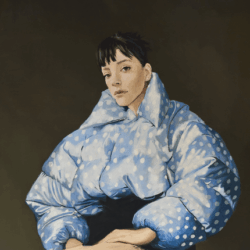At 26, Nick “Nick Diamonds” Thorburn has come into his own over the past four years. Besides shedding the “Nick Diamonds” moniker and his former band (The Unicorns), the Canadian musician currently helms indie-pop/prog stars Islands, who just released their second album, Arm’s Way, to mixed reviews.
Though former bandmate and songwriter Jamie Thompson opted out of the band in May 2006, Thorburn has managed to keep the project together and seems to be better for it, calling Arm’s Way is his best work yet.
The Voice caught up with Thorburn at the onset of his summer 2008 tour to talk about tendinitis, the occult, and why people think he’s an asshole. (And in case you didn’t know, the Unicorns are dead.)
The Voice: Has it been intimidating taking on principal songwriter for this album?
Nick Thorburn: No – it was a challenge at first when the boat got rocked a little bit when Jamie left and everything. It was sort of in a state of disarray, but it’s been pretty similar. The big change is really the band as a whole versus the first record mostly being slapdash, impromptu arrangements. This record was really a band project and, yeah, I was the principal songwriter but I was pretty much on the first record too. So, nothing has changed. I’ve developed and grown as a songwriter, but the band is what has really pushed things to the next level.
The Voice: Is that happening more in the studio or out when you’re playing?
Thorburn: Our shows definitely inform our record. We take playing shows, arranging, and rehearsing very seriously. We’re not the type of band that goes into the studio and improvises. We don’t have the time or the money – or we didn’t at that time. All that stuff gets worked out in advance and we spent the better part of 2006 rehearsing most of these songs and then recorded them in ’07. Then [we] went through a huge legal battle to get onto ANTI. Not a huge legal battle, but a pretty significant one.
The Voice: Were there problems on the previous label [Equator Records]?
Thorburn: Yeah, I won’t get too specific…We weren’t happy there and it wasn’t the most accountable group of people. We were lucky enough to have ANTI– step in and say, hey, we want to help you get off of that label even though you’re entitled to them and get onto ANTI-. I don’t want to dwell on the negative. Just think of the positive which is that ANTI– is a great label and doing good by us.
The Voice: In terms of Jamie leaving – I know you’re still in a few side projects with him [Th’ Corn Gangg] – is that relationship –
Thorburn: Oh, totally mended. [Holds out arm, currently nursed by ice.] Not as mended as my arm, for sure.
The Voice: What happened?
Thorburn: I have tendinitis in both arms. It’s manageable; it’s early stages, so it’s cool – just trying to keep it iced. But yeah, Jamie and I are on really good terms; I think we always will be. There was a bit of a bumpy ride when he announced he was departing. I just was reacting strongly.
The Voice: Because you have the third track of your new album [“J’aime Vous Voire Quitter”]…
Thorburn: Yeah, it’s a French phrase meaning “I love watching you leave,” and it’s also a pun on his stage name [J’aime Tambeur]. I vented; I got it out of my system. I got it out early and we’ve moved on.
The Voice: Earlier, you talked about the first album being a ramshackle affair –
Thorburn: In a way. I say that a lot because all of the layers we added to it were but Jamie and I worked on the songs and worked out the basic structure. And Jamie’s contribution is not to be underestimated. In a way, the layers that we added were from guest musicians coming in and that was fairly impromptu.
The Voice: This time around you worked with a producer [Ryan Hadlock], correct?
Thorburn: Yes, we didn’t really ever have one before.
The Voice: What was that like?
Thorburn: It was a big step up in terms of the quality of the production and this coach that was guiding us and coercing us; coaxing the best performances out of us that we could get. And also just setting up the mics properly, setting the tone, setting the vibe of the record really well.
The Voice: ANTI– said something about him having some strange rituals. What does that entail?
Thorburn: I feel like I’m outing him as this occultist, but I think he has a flair for the dramatic in a really good way. He wants to get into the spirit of things, so to speak.
The Voice: Any examples?
Thorburn: He’ll put salt on the windowsills and light candles in a ritualistic manner. And it was really this tribute to this producer he really likes, Joe Meek, who was fully immersed in the black arts and the occult. And [those] sorts of things that I’m not going to get into because I don’t know about them and I’m in Washington, D.C. which was built by freemasons. The walls can talk so…
The Voice: I read somewhere that you already had the name of the album in mind when you went into the studio. Was there a theme that were trying to bring out?
Thorburn: Yeah, there was. “The Arm” was really the turning point in realizing that – it’s the centerpiece of the record. “Arm’s Way” refers to the way of the arm in an ambiguous sort of way that could either be perceived as with good intentions or with bad.
The Voice: As you nurse your tendinitis…
Thorburn: As I nurse my tendinitis, ironically, yeah.
The Voice: In terms of that approach, do you plan to continue keeping a concept as you write?
Thorburn: I think I’m just naturally drawn to concepts and having threads that weave throughout a work. Otherwise, why is it a work? Especially in this day and age when singles and Mp3s are become more prevalent, there’s no need for an entire album if there’s nothing that ties it together.
The Voice: Do you ever read any of the criticism about your work?
Thorburn: Oh, yeah. I try not to because I’m easily influenced by that sort of stuff. And I love when it’s good but I try to avoid all of it because all of it warps your perception and idea of what you’re doing. But the negative stuff really stings, you know? I read some pretty hurtful things [about Arm’s Way] that sounded like somebody just had a grudge or a bone to pick, you know?
I like that this record divides people; it’s something that’s worth discussing. It’s a difficult record and one that takes awhile to get into and it can affect you negatively, I understand that – it’s a little overblown. And I think a lot of people are going to react negatively to that especially in light of Return to the Sea because they are such different records…
You have like a really DIY sort of approach on the first record and a really indie–chic kind of thing that I never was interested in – it was always budgetary. I’ve always been into making things sound nice, it’s just never been an option. So this was really the first time when we decided to go for it and make things sound nice. And I think a lot of people react strongly to that.
The things that I’ve read that are negative are just – I know a lot of people who know me, I guess, don’t like me for whatever reason. They think I’m a jerk or something. You know, shy/asshole confusion. That’s what Larry David said.
The Voice: Have you been trying to move away from this perception of being a jerk?
Thorburn: No. I mean, I am who I am. If someone thinks I’m an asshole, I’m not going to change who I am. I’m shy – that’s ultimately what it is and sometimes I get caught off-guard.
The Voice: One – sorry to do this, but –
Thorburn: No, it’s cool, we’re getting gossipy.
The Voice: One critic said that she felt like the record was like your own personal 69 Love Songs [by the Magnetic Fields.] I think what she meant was that it’s supposed to be this definitive thing for Islands. Do you feel the same way?
Thorburn: Yeah, if this was the last record I ever made, I’d be happy. I think it’s that definitive. It’s something that sums it up for me, at least where I am now. I’m always in a state of flux – I felt pretty strongly about Return to the Sea when it came out but now I feel like a completely different person made it. Definitely someone with a different name.
The Voice: You’ve mentioned in interviews that you want to make records for a long time. Do you ever fear this point where you’ve made a definitive statement and after that – you know how certain artists will release an album that people just don’t get over.
Thorburn: That’s a concern, for sure. You don’t want to just be remembered for past works that you have no attachment to. You can’t control anything. I don’t even control how the songs ultimately are going to sound, a lot of it just happens naturally. That’s the idea of writing songs and then releasing them is that you have to let go, you have to be able to let go.
The Voice: Uh, you –
Thorburn: But some people can’t let go, you know? Some people are too attached to a band like the Unicorns [and] are not able to let go. And that’s fine, you can dream all you like, but that band is dead and gone. And never coming back.




